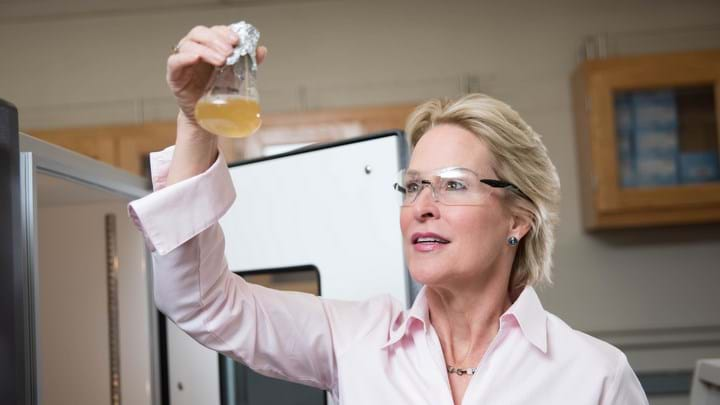Caltech chemical engineer Frances Arnold wins Nobel Prize

CHEMICAL engineer Frances Arnold has been awarded the 2018 Nobel Prize in Chemistry for her pioneering work that mimics evolution to engineer enzymes.
Arnold is professor of chemical engineering, bioengineering and biochemistry at the California Institute of Technology (Caltech), US. In 1993, she conducted the first so-called ‘directed evolution’ of enzymes. This involves mimicking natural selection to create new proteins that work as biological catalysts. Arnold has since refined the methods which are now routinely used in academia and industry. They have enabled cleaner and cheaper industrial processes for the manufacture of a wide range of products including drugs, detergents and fuels made from biomass.
Arnold, who gained her PhD in chemical engineering at University of California Berkeley in 1985, was woken by a call at 4am to tell her she had won the prize. "I am absolutely floored. I have to wrap my head around this. It's not something I was expecting." she told her university’s news service.
"Life – the biological world – is the greatest chemist, and evolution is her design process," Arnold said. "I may not be the best chemist but I do appreciate evolution."
Her work has overcome the slow and costly process of protein modification. She has described directed evolution as a version of breeding that uses advances in molecular biology to evolve not a whole organism but a protein with desirable features. It leans on the principles of evolution by not seeking a final design but instead making random mutations to genes, selecting the ones that produce proteins with the most desirable properties and then repeating the process time and again to produce iterative benefits.
Speaking in 2016, after winning the prestigious Millennium Technology Prize for her work, Arnold said: “I don’t have the same constraints that the farmer or the dog breeder had in the past — I can choose genes from three or 33 parents, recombine genes from different species, and I can control the rate and nature of the mutations. And I can select from their protein products those with features I like — say an enzyme that catalyses a new reaction to make a useful chemical or one that could be used to cure a disease or one that does a better job at taking stains off clothes.”
The method allows researchers to circumvent what Arnold describes as “our near complete ignorance” of how DNA sequences encode a specific function which is not understood well enough to directly tailor something useful.
“Evolution is the most powerful engineering method in the world, and we should make use of it to find new biological solutions to problems,” Arnold said.
Reacting to the award, Caltech chemical engineering professor David Tirrell said: "Through decades of commitment to exploring a powerful idea, Frances has transformed the fields of protein chemistry, catalysis, and biotechnology. She has changed the way we think about things and the way we do things."
Arnold was awarded one half of the Nobel Prize. The other two recipients are biologists George Smith and Gregory Winter. Smith developed a method known as phage display that uses a virus that infects bacteria to evolve new proteins. Winter has used phage display for the directed evolution of antibodies to produce new drugs to cure metastatic cancer and counteract autoimmune diseases.
Oliver Jones, a professor of chemistry at Australia’s RMIT University: “Many congratulations to Professors Arnold, Smith and Winter. This award is great news. At first glance it may seem that the Chemistry Nobel has been ‘biologised’ again. It is sometimes hard to see how an enzyme, or a phage, are ‘chemistry’ – but they are! It is chemistry that governs the shape of these molecules, which in turn affects their function. It is chemistry that controls how enzymes interact with their substrates or phages bind to bacteria and how antibodies neutralise toxins and cure disease. Chemistry underpins so many things in our lives, even if it is not always immediately obvious and it is great that these discoveries are getting recognised. Congratulations again to all!”
Recent Editions
Catch up on the latest news, views and jobs from The Chemical Engineer. Below are the four latest issues. View a wider selection of the archive from within the Magazine section of this site.




